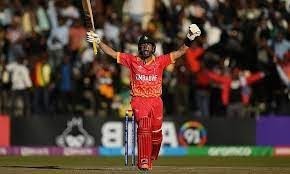
The 37-year-old, though, now thinks that the sport’s resurgence both on and off the field might be a “glimmer of light” for the country.
Williams led his team in runs scored during a recent qualifier match held in Zimbabwe. Despite nearly missing out on a spot at this year’s ODI World Cup, the Chevrons will now miss the competition for a second time.
Although Sri Lanka and the Netherlands secured their spots at the event, which gets underway in India in October, head coach Dave Houghton believed Zimbabwean supporters had discovered something to “truly love” after a string of valiant performances from his team.
Williams made his ODI debut as an 18-year-old in 2005, not long after Andy Flower and Henry Olonga’s black armband protests during the 2003 World Cup, a competition that three African countries—Zimbabwe, South Africa, and Kenya—co-hosted.
The high-profile protest against then-president Robert Mugabe, according to Olonga, Zimbabwe’s first black Test cricketer, was to lament “the death of democracy.” He was compelled to leave the nation as a result of the protest and never again represented Zimbabwe on the field.
The fallout from what happened in 2003 originally also caused Williams to end his international career at an early point, despite the fact that he made his senior debut two years later.
The all-rounder admits that several coaches had also left the team in addition to many players.
“The coaches’ standards dropped dramatically right away. In their eyes, they were the only club players with coaching certificates.
When you’ve been playing international cricket and someone is attempting to coach you who doesn’t actually have that expertise on the field, it’s quite challenging.
“I reached a point where I turned to look around and realized that this was not going to work.”
Williams was troubled by issues off the field as well.
Many things changed once a few people gained control, he claims. “Office staffers were hired in greater numbers than athletes. It felt like a nightmare.
“We were performing really well individually,” he claims, “there were four or five guys scoring all the runs.
We had wage disputes in addition to a lot of weight to bear. That, in my opinion, signaled the end of Zimbabwe cricket.
It’s difficult to be treated that way in a professional setting while making sacrifices to be away from family and home and without receiving compensation.
After a two-year “dark period” during which his career completely stalled, Williams eventually returned to cricket in Zimbabwe after having difficulty with his game starting in 2008.
Around 2011 and 2012, he says, “I took a break and didn’t play for about two years.”
“I would go out and act foolish and get fired. I would make an explanation for missing training.
I was unaccustomed to acting so professionally.
The Zimbabwe national side, which had returned from a six-year Test exile in 2011, was led by English coach Alan Butcher, father of former England player Mark Butcher, at the time of Williams’ comeback.


Share your thoughts